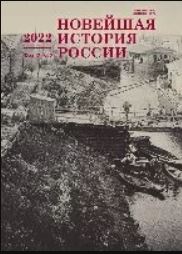Переход от «военного коммунизма» к нэпу в казачьих областях Юга России: особенности взаимодействия власти и сельского населения
Transition from War Communism to NEP in the Cossack Regions of Southern Russia: Features of Interaction between the Government and the Rural Population
Author(s): A. V. Baranov, Yu. A. YakhutlSubject(s): Government/Political systems, Politics and society, Rural and urban sociology, Interwar Period (1920 - 1939), History of Communism
Published by: Издательство Исторического факультета СПбГУ
Keywords: NEP; war communism; south; Russia; Cossack regions; food;
Summary/Abstract: This article explores the transition from “war communism” to the New Economic Policy in the Cossack regions of Southern Russia, one of the leading agricultural regions. The authors aim to identify regional features of the transition to the NEP on the Don, Kuban, and Terek in the context of military-political conflict between the authorities and the rural population. The novelty of this study is sources used for the first time: reviews of Special departments of military units and bodies of the Cheka, the North Caucasus Military District, reports of party bodies of the RCP(b), and Cheka organs. The reasons for the slow transition to NEP, weak support for NEP, and resistance to reforms of local party and Soviet employers are identified. The Civil War in the Cossack regions of Southern Russia was the most protracted and fierce, and it was a compound conflict: it combined class, class, and center-regional confrontation. The main subject of the conflict in the agrarian region was the ownership of land and agricultural products. The Soviet system destroyed the local Cossack self-government and abolished the estates, but it forced to preserve the labor allotment land use of the Cossacks. The Don and Kuban were the main sources of food for European Russia, what led to the preservation of the “war-communist” practices of food policy in 1921–1922. The personnel of the party and state authorities remained illiterate, recruited mainly from the inhabitants of other regions, and often underwent rotation. These factors caused not only an escalation of the social conflict, but also a crisis of governance. The transition to the NEP required the gradual restoration of civil peace in the Cossack regions, what was mostly achieved by the end of 1922.
Journal: Новейшая история России
- Issue Year: 12/2022
- Issue No: 39
- Page Range: 276-287
- Page Count: 12
- Language: Russian

